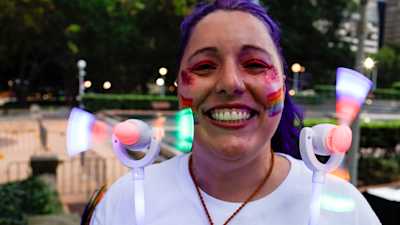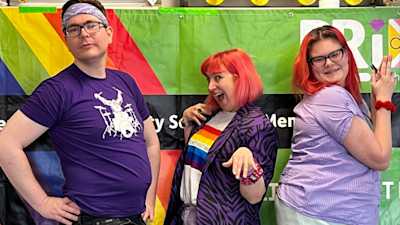Scout, Professional Learning Specialist, shares simple actions that go a long way towards creating a safe environment for the trans and gender-diverse community.

Image: Scout wearing a pink visor and a white t-shirt with a rainbow flag on it, looks off to the side, surrounded by attendees at the 2024 Sydney Mardi Gras parade.
Trans Day of Visibility (TDOV), held on 31 March, is a day dedicated to celebrating trans pride and awareness and recognising the contributions of trans and gender-diverse people.
TDOV is about learning and celebrating with trans and gender-diverse people by sharing stories, starting conversations, and attending events.
To celebrate TDOV, Scout, who uses they/them pronouns, sat down with us to share their lived experience as a trans and non-binary person.

Image: Close-up photo of Scout, who has short blonde hair, wearing glasses, a silver chain and a black t-shirt.
“Growing up, I felt like I was ‘different’ from my peers at school. For most of my life, I attributed it to my sexuality. But then, about ten years ago, I stumbled upon a diverse sporting community,” said Scout.
“A friend within that community shared a social media post about coming out as non-binary it felt like a magical movie moment—a glowing rainbow on the screen with a triumphant ‘ta-da’ sound effect.”
“Suddenly, there was a label that seemed to fit perfectly: non-binary. “
“So, I floated the idea of this and using gender-neutral pronouns with my partner at the time and close friends, and Scout was born! That was over 10 years ago now.”
One element that impacted Scout's journey was the increased visibility of trans and gender-diverse individuals.
“Trans and gender-diverse visibility means that we can recognise that people who are not cis-gendered exist and, despite how we’re historically portrayed in the media, we're not the evil character. We're not all messed up because we’re trans or gender diverse,” said Scout.
“Then, it’s about even going beyond binary genders as well because people can be trans masc, trans femme, or you can be wherever; gender is a spectrum. So, for me, being gender diverse, it's super important to have a day of visibility as well.”
Scout highlighted that the visibility of trans and gender-diverse people is also important for the wider community.
“When people go, ‘Oh, I’ve never met a trans person or a non-binary person,’ I always say, you have, you just maybe didn’t know. So, Trans Day of Visibility also helps normalise visibility for the broader community.”

Image: A group of people stand with their backs to the camera. One individual wears a rainbow flag over their shoulders.
While significant progress has been made in recent years with more visibility than ever, trans and gender-diverse people still face discrimination, violence, and threats to their fundamental human rights.
Visibility requires safety. We are all responsible for creating environments that support the visibility of trans and gender-diverse people, allowing them to be seen, heard, and, ultimately, included - particularly in the workplace.
“I feel, as far as workplaces and organisations go, Life Without Barriers has been the only organisation where it felt like I’m able to be me, present as me, and be comfortable to state my pronouns.”
“It’s very different, but it’s great. And I feel like everyone should be aiming to do the work that we're doing,” said Scout.
Coming out as trans or gender-diverse in the workplace can be fraught with challenges, so when organisations support visibility and prioritise creating inclusive environments, it makes all the difference.
Scout shared that Life Without Barriers created a safe environment for trans and gender-diverse people from the outset, which supported them to feel comfortable to come out at work.
“I don’t think I actually came out. I just interviewed as me, which is amazing to do.”
“I think that it came from just Googling Life Without Barriers when I came across the job ad. Seeing on the public-facing website that they had a section about diversity and inclusion was great,” reflected Scout.
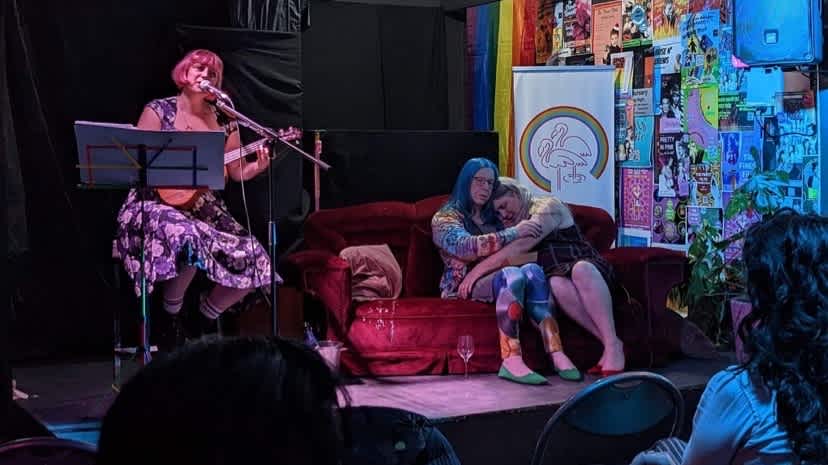
Image: Feast Festival show where Phi interviewed Gail and Lisette (the TLLPC) about their transgender experience. Phi is playing an instrument on a stage while Gail and Lisette are cuddled up on the couch.
“At first, you’re like, same old. But when you look, they actually had videos with openly trans and queer people on the website who work with Life Without Barriers, and I was like, I think this might be the place for me. How beautiful is that?”
“I felt comfortable interviewing as my whole self."
"And not just because someone’s going, ‘Oh, bring your whole self to work’. I’ve fallen for that before, but at Life Without Barriers, people really are being their whole selves.”
“I was like, I’ll just be me and have my pronouns on my resume and state them in the interview. Then getting emails back when I applied for the job, people who were communicating with me from the organisation had their pronouns in their email signatures, which goes a long way too,” said Scout.
Scout explained why the use of pronouns in the workplace is so important.
“When people communicate their pronouns, it ensures that it’s not a case of feeling othered and that you're the only one putting your pronouns in your signature because it's different to he or she.”
Unfortunately, in the past, Scout has experienced a very different attitude when coming out at work.
“I sent an email to my workplace that I’d been at for five years coming out and…crickets! I remember maybe one or two colleagues replied to me, and that was it. Silence from everyone else. And then continually getting pronouns wrong and all that kind of stuff, it was draining and exhausting to deal with.”
“But, at Life Without Barriers, there was no need to come out because it’s literally just being yourself.”
“I think even earlier on, I said to my work team I'm on testosterone, and at the time, nearly two years ago, I’m sure my voice has gone deeper since then; my voice is changing. I get acne; if I end up with a neckbeard, just gently tell me to shave. I don’t want to be that neckbeard person,” laughed Scout.
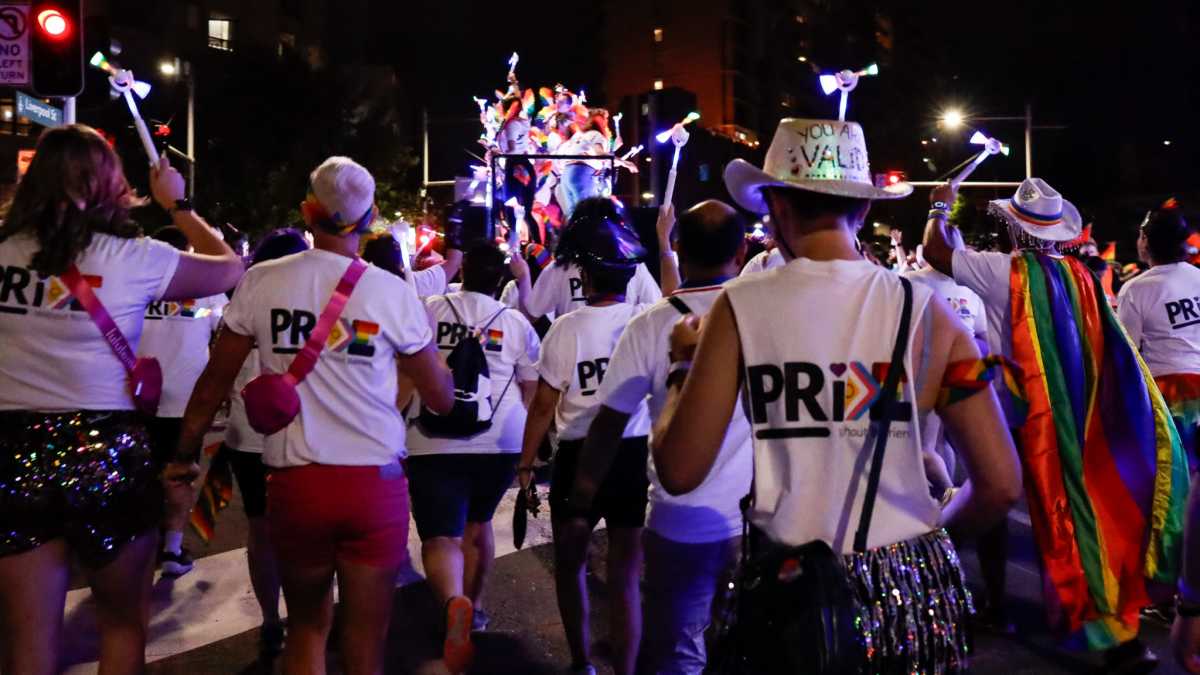
Image: Life Without Barriers staff, carers and the people we support march behind the float in the Mardi Gras Parade.
Scout explained that for many people transitioning, it feels like going through a second puberty.
“For trans folks who choose medical transition with hormones, they really go through a second puberty. I have been,” Scout shared.
“To be like, ‘this is the puberty I should have gone through,’ is intense, and I feel a kind of mourning that I didn’t get to go through that the first time. But being able to be open about it and not feel like I'm just suffering in silence, particularly at work, has been incredible.”
“The more I have felt socially accepted, the more I have felt safe to try hormone replacement and bind my breasts. And almost 4 months ago, for my 42nd birthday, I got my new chest! It has been a journey, to say the least, and continues to be. But knowing my colleagues and workplace have my back is just something else!”

Image: Life Without Barriers staff at the Newcastle office with rainbow flags.
When asked how allies can show up for the trans and gender-diverse community, Scout had a few tips to share.
"Seeing people put their pronouns in the email signatures is a great start. I think people can go even further and, in team meetings and the like, normalise introducing yourself with your pronouns. I know my team has been increasingly better with that.”
“This started after a conference where everyone was wearing pronoun stickers. I mentioned to my team that it was such an inclusive thing to do, especially without me having to be the person who pushes for these things.”
“Seeing the stickers, I was just like, this is great. I'm not the token trans non-binary person going around, saying ‘Can everyone wear pronoun stickers?’ because they were already doing it.”
“People will mess up pronouns; it happens. But not having to be the person who always has to correct people is also important because it's exhausting. Sometimes it's fine for weeks, and then in a day, you can have five people get your pronouns wrong, which can be draining.”
“I think part of allyship is people taking on that responsibility to be that person who says things like ‘Actually, Scout’s pronouns are they/them’, so I don’t have to. Actions like that are bigger than people seem to think they are.
“When I spoke to my team, we reflected on the whole conference, and I said I was really glad that you put on pronouns stickers and got participants to do that, too. And they were like, ‘Yeah, sure, no big deal’. But for me, it is kind of a big deal to me to see that.”
“It's such a simple thing that doesn't really cost anyone a whole lot of effort. It's just one little thing to role model. ‘This is how I'd like you to refer to me. How would you like me to refer to you?”
“And when people mess it up, it's important to remember it's not some big deal. You can self-correct and move on.”
We encourage you to take a moment to learn more about the experiences of trans and gender-diverse people, listen to and amplify their voices, and reflect on how you can practice your allyship to support them.
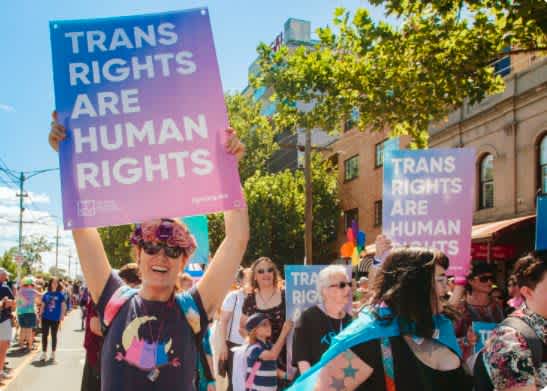
Image: Trans rights march. There is a person holding a sign that says 'Trans rights are human rights'.
You can learn more about TDOV by visiting:
You can also read about our LGBTQIA+ journey here.
At Life Without Barriers, we celebrate diversity, and we practice inclusion. We want our employees to be accepted and welcomed for the difference and diversity they bring. This means providing a safe and supportive workplace for everyone, inclusive of culture, ethnicity, faith, age, disability, sexual orientation, gender identity/expression, intersex status, and relationship status. You can learn more about our commitment to a diverse and inclusive workplace here.

